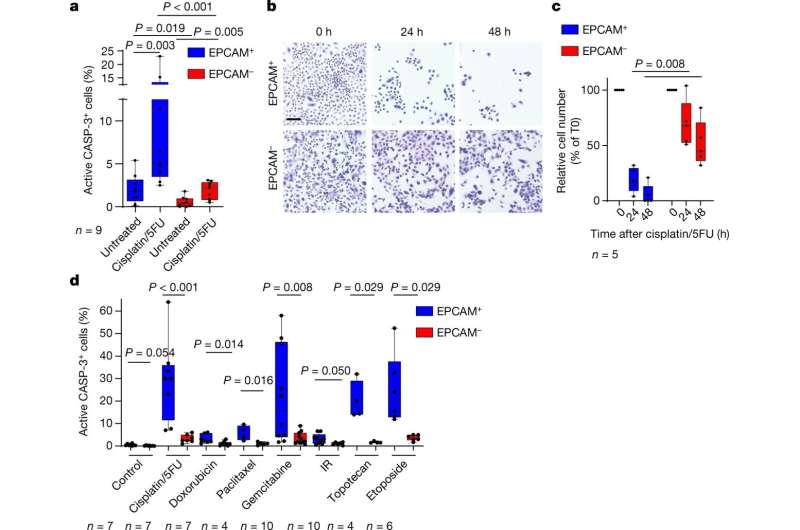This article has been reviewed according to Science X's editorial process and policies. Editors have highlighted the following attributes while ensuring the content's credibility:
fact-checked
peer-reviewed publication
trusted source
proofread
Discovery of a protein controlling resistance to chemotherapy

Despite the recent development of new targeted therapies, chemotherapies remain the most frequently used treatment to treat patients suffering from advanced cancers. Chemotherapy resistance is one of the main causes of treatment failure and death in cancer patients.
It has been suggested that the epithelial-mesenchymal transition (EMT), a process by which epithelial cells detach from their neighboring cells and acquire invasive properties, plays a role in the acquisition of resistance to anti-cancer therapy. However, the mechanism by which cancer cells presenting EMT resist to anti-cancer therapy is currently unknown.
In a study published in Nature, researchers led by Prof. Cédric Blanpain, MD/Ph.D., WELBIO investigator, Director of the Stem Cells and Cancer Laboratory and Professor at the Université Libre de Bruxelles, discovered that a protein named RHOJ allows cancer cells presenting EMT to resist anti-cancer treatments by stimulating the repair of DNA damage caused by the chemotherapy.
Maud Debaugnies and her colleagues showed that cancer cells presenting EMT become resistant to chemotherapeutic treatment. They found that RHOJ expression was particularly high in chemotherapy-resistant cells. They then showed that by silencing RHOJ, cancer cells became sensitive to chemotherapy.
"It was particularly exciting to understand the mechanisms that allow cancer cells to resist chemotherapy, paving the way for the development of novel and more effective therapeutic strategies to treat cancer," says Maud Debaugnies, the first author of this study.
Maud Debaugnies and her colleagues then studied by which mechanisms RHOJ makes cancer cells resistant to chemotherapy. Chemotherapy induces DNA damage in cancer cells which activates the death of these cells. They discovered that RHOJ can activate the DNA damage repair pathway induced by chemotherapy, allowing cancer cells to repair the DNA lesions and escape cell death.
"Our discovery that the inhibition of a single gene can make cancer cells sensitive to chemotherapy opens new avenues for the development of drugs targeting RHOJ that should decrease the resistance to chemotherapy in patients with cancers presenting EMT," says Prof. Cedric Blanpain, the director of this study.
More information: Cédric Blanpain, RHOJ controls EMT-associated resistance to chemotherapy, Nature (2023). DOI: 10.1038/s41586-023-05838-7. www.nature.com/articles/s41586-023-05838-7



















